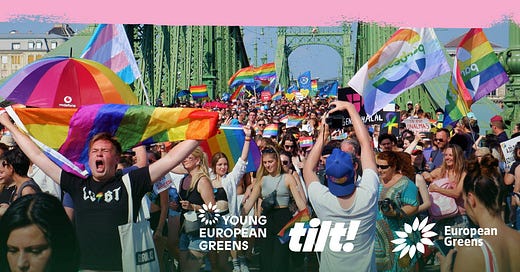LGBTQ+ and Jewish in Hungary
For Pride month, I talk with Hungarians living at the edge of faith and the culture war
This spring, the Hungarian government implemented a series of discriminatory laws targeting Hungary’s LGBTQ+ community. The conflict over the new laws is coming to a head now during Pride month. Along with fining people for attending an outdoor Pride celebration, Viktor Orbán’s national government, through the police administration, has said it will not allow the annual Pride parade through downtown Budapest. (Fines could exceed $180 USD. The Hungarian Helsinki Committee has published a FAQ about participants’ legal rights.) Yesterday, the Budapest city council announced it will organize the parade, bypassing Orbán’s government since the city council does not need police permission to organize public events.
Hungarian LGBTQ+ groups have responded defiantly to Orbán’s attacks.
But the law’s targets are also LGBTQ+ allies in the non-profit sector. Fines can be levied against any organizational participant in Pride events; it doesn’t matter if the organization’s core mission has anything to do with LGBTQ+ rights. In other words, the law does not discriminate in its discrimination.
LGBTQ+ allies in the civil society sector are facing a risky choice. Some groups may decide to moderate their previous active support for Pride. While $180 USD isn’t a life-changing sum, getting on a government “black list” could be an existential punishment for small-budget NGOs. In Hungary, allyship has become a matter of organizational life-or-death.
How are Hungary’s religious groups responding?




